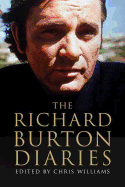
At one point in the early 1960s, Richard Burton recalled, he thought about giving up his acting career to become a writer. "Not for a living, not for money," he clarified years later. "I wanted to write because I sought for some kind of permanence, a cover-bound shot at immortality." This is just one of many frank self-assessments in The Richard Burton Diaries.
The core of this material, as collated by Welsh historian Chris Williams, spans 1965 to 1972, and his turbulent relationship with Elizabeth Taylor is a dominant subject. "I have been inordinately lucky all my life but the greatest luck of all has been Elizabeth," he would write, just before recounting a brutal argument: "Christ if you can marry Eddie Fisher you can marry anybody, I said, and having created wounds, rubbed the salt in nicely for an hour or so." (He stopped keeping entries shortly after their eighth wedding anniversary, so there's no contemporaneous account of their first divorce, and his entries during their brief second marriage are sparse.)
The ultimate subject of the diaries, though, is Burton's own self-image, including his frustrations with acting: "I am fundamentally so bored with my job that only drink is capable of killing the pain," he writes. He was also a canny observer of the world around him, with unflinching verdicts on colleagues from Franco Zeffirelli to Lucille Ball. The glimpses of celebrity life are entertaining, but it's the eloquence with which Burton shares his innermost thoughts that makes The Richard Burton Diaries endure. --Ron Hogan, founder of Beatrice.com

